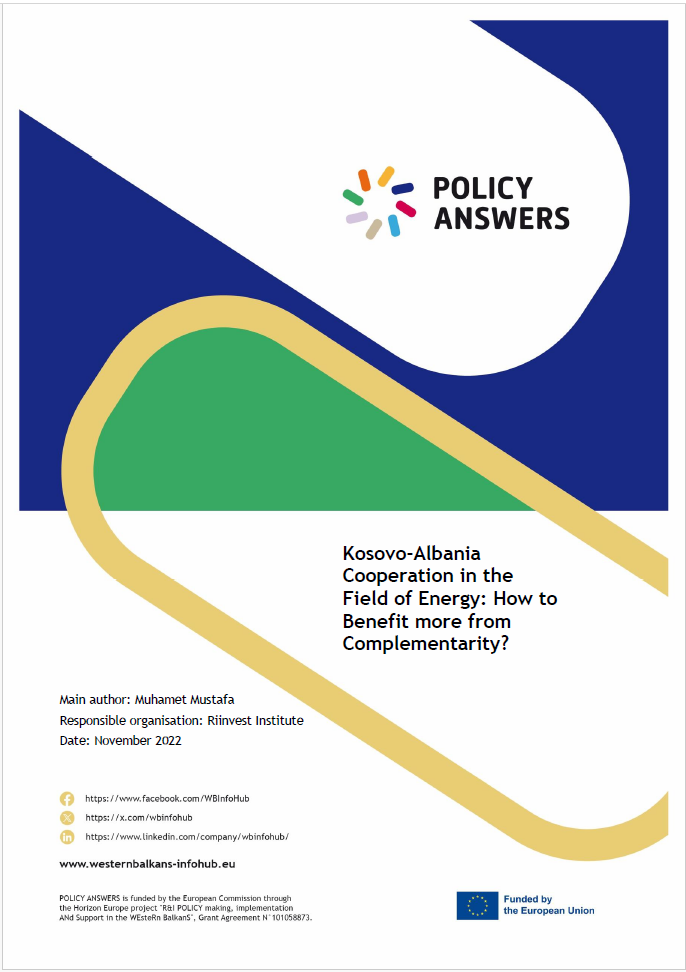This POLICY ANSWERS Brief was prepared in November 2022 by Muhamet Mostafa and published by the Riinvest Institute.
This document is part of the ‘Green Talks’ debate series within the Green Action Space platform, a joint initiative of the Riinvest Institute and the Kosovo Foundation for Open Society (KFOS). In this debate (15 November 2022), particular attention was paid to the important issue of cooperation between Kosovo and Albania in the field of energy. The focus of the discussion in this panel was how to benefit even more from complementarity. The panellists were distinguished personalities, representing both the public sector (Mr. Sabit Gashi, Head of the Energy Department – Ministry of Economy of Kosovo and Mr. Enea Karakaçi, Executive Director for Energy and Industry at the Ministry of Infrastructure and Energy of Albania) as well as Dr. Ali Hamiti, Professor at the Faculty of Electrical Engineering, former Director of Kosovo Energy Corporation and head of the Energy Regulatory, and Dr. Lorenc Gordani, Professor and Head of Master Studies at the Tirana Business University (TBU) and Legal Advisor for energy issues. The discussion was moderated by Prof. Muhamet Mustafa, Senior Advisor at the Riinvest Institute. The content of this publication is the responsibility of the Riinvest Institute.
The fundamental issue in this policy brief is how to benefit more from the emphasized complementarity in the energy field between Kosovo*1and Albania regarding energy resources and meeting energy needs2. This should naturally result in more effective cooperation between the two countries, not only to overcome the current crisis that has hit both countries with extremely high prices and supply problems but also for long-term development and optimisation of the two interconnected energy systems, especially with the challenges of integration into the European Union (EU) and obligations towards the Green Agenda. The question raised for discussion is whether complementarity helps increase capacity to meet their needs or this can be achieved without it. These and some other dilemmas are addressed in this brief overview, with reference to the latest developments in the energy market.
Albania and Kosovo were among the first countries to be affected by the increase in energy prices in the late summer of 2021, which was followed by the declaration of emergency by both governments3. In this context, regional cooperation, especially close cooperation between the two countries, becomes essential for achieving national energy security. To promote such cooperation, the two governments, as well as corporations and operating systems and regulatory, have held numerous discussions, meetings, and memorandums of understanding over the past two decades. However, until the beginning of the third decade, there have not been many tangible results, except for the simple exchange of surpluses, especially in situations of supply crises. After the activation of the 400 kV interconnection as the main strategic link of the energy systems of both countries and the access of Kosovo to the European Network of Transmission System Operators for Electricity (ENTSO-E), among many developments in October 2020, Albania and Kosovo established a joint stock company the Albanian Power Exchange (ALPEX), owned by the transmission system operators of Albania (OST) and Kosovo (KOSST), respectively 57.25 % and 42.75 %. ALPEX will operate in day-ahead and intra-day markets in both Albania and Kosovo, adopting the unique European model. Additionally, the two countries have established a common energy market and agreed to cooperate in meeting energy-balancing needs.
In fact, the energy systems of Kosovo and Albania urgently need to increase their stability, flexibility, and above all, supply security. Cooperation between our two countries is considered the key to tackling the electricity price crisis, which adds to the issue of energy independence, by converging towards sustainable development, with high efficiency and low cost for the consumer. Efforts have been made and there have been positive developments in the last 2-3 years, but all of these are expected to be implemented to have the fullest effect.
The report outlines the general situation and provides views on the potential benefits and outlines some priority joint projects. It concludes with recommendations.

